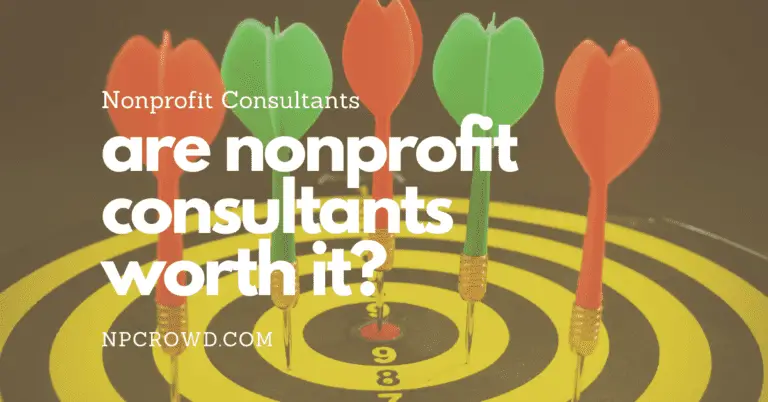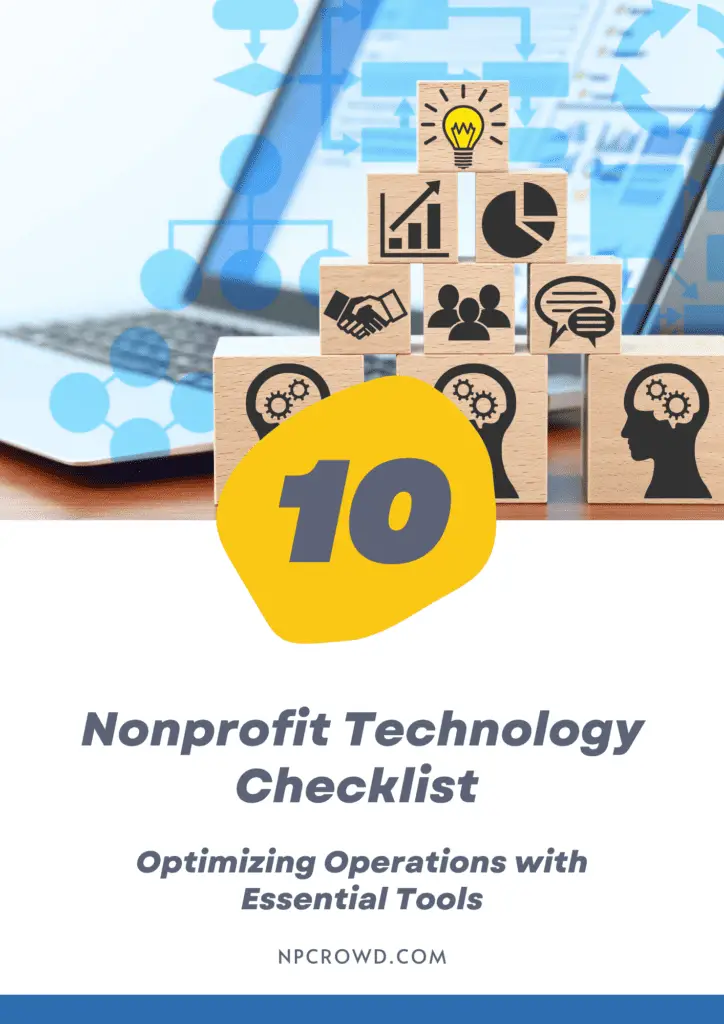5 Things Your Consultant Wants You to Know: Prepare to Hire a Nonprofit Consultant
Disclaimer: This post may contain affiliate links. These links, if used and purchases made, we may earn a small commission. These affiliate programs do not impact the recommendations we make or the resources we refer you to. Our focus is on providing you the best resources for your nonprofit journey.
Are you considering hiring a nonprofit consultant to help your organization reach new heights? The process of finding and selecting the right consultant can be daunting, but with the right knowledge and preparation, you can make a confident and informed decision. In this article, we will share five important insights that your consultant wants you to know as you embark on the journey of hiring a nonprofit consultant.From understanding the importance of consulting skills to assessing communication, observation, and problem-solving abilities, these tips will help you navigate the process and ensure that you find the perfect fit for your nonprofit. Let’s dive in and discover what your consultant wants you to know before you begin the nonprofit consultant hiring process.
Key Takeaways:
- Consulting skills are crucial for the success of nonprofit consultants.
- Effective communication skills are essential for meaningful collaborations.
- Observation skills enable consultants to provide valuable feedback and recommendations.
- Assessing problem-solving abilities is key to finding a consultant who can drive results.
- The nonprofit consultant hiring process requires careful consideration and planning.
The Importance of Consulting Skills
When it comes to finding the right nonprofit consultant, having a thorough understanding of the necessary consulting skills is essential for a successful recruitment process. Nonprofit consultants possess a range of skills that are vital to their field, and by recognizing the importance of these skills, you can ensure that you select a qualified and capable professional to help your nonprofit thrive.
Some of the key consulting skills that nonprofit consultants should possess include:
- Marketing: A consultant should have a strong understanding of marketing strategies and be able to develop effective campaigns to promote your nonprofit and its mission.
- Sales: Having sales skills allows a consultant to effectively communicate the value of your nonprofit’s programs and services, increasing support and funding.
- Fees: Consultants should possess effective negotiation skills to ensure that your nonprofit is receiving fair compensation for their services.
- Operations: A consultant who is well-versed in nonprofit operations can provide valuable insights and recommendations for optimizing your organization’s processes.
- Time Management: Nonprofit consultants should be skilled at managing their time efficiently to meet deadlines and deliver results in a timely manner.
- Organization: Strong organizational skills enable consultants to effectively manage projects and ensure that all necessary tasks are completed.
- Emotional Intelligence: Consultants with high emotional intelligence can navigate complex interpersonal dynamics within your nonprofit and foster positive relationships.
- Project Delivery: The ability to successfully plan, execute, and deliver projects is crucial for a consultant to achieve the desired outcomes for your nonprofit.
By prioritizing these consulting skills during the recruitment process, you can find a nonprofit consultant who possesses the necessary expertise to drive meaningful impact for your organization.

| Consulting Skills | Importance |
|---|---|
| Marketing | Effectively promote your nonprofit |
| Sales | Increase support and funding |
| Fees | Ensure fair compensation |
| Operations | Optimize organizational processes |
| Time Management | Meet deadlines and deliver results |
| Organization | Efficiently manage projects |
| Emotional Intelligence | Navigate interpersonal dynamics |
| Project Delivery | Achieve desired outcomes |
Communication Skills Are Key
When hiring a nonprofit consultant, one of the most important qualities to consider is effective communication skills. Nonprofit consultants need to be able to engage in meaningful conversations with clients, ask insightful questions, and present their analyses in a clear and concise manner. Additionally, their ability to convey their value through writing is crucial for developing impactful reports and proposals.
During the interview process, it’s essential to assess a consultant’s communication skills to ensure they can effectively communicate with your organization and stakeholders. Look for consultants who demonstrate:
- Active listening skills: Consultants should be attentive and truly listen to your organization’s needs and challenges.
- Clear and concise communication: They should be able to convey complex ideas in a way that is easily understood by different audiences.
- Strong writing abilities: Consultants often need to create reports, proposals, and other written materials. Ensure they have excellent writing skills to deliver high-quality documents.
- Empathetic communication: It’s important for consultants to understand the emotions and needs of your organization and stakeholders to build strong relationships and trust.
By evaluating a nonprofit consultant’s communication skills, you can ensure they have the necessary abilities to effectively collaborate, convey their expertise, and align with your organization’s goals.

| Communication Skill | Description |
|---|---|
| Active Listening | Actively engaging in conversations, asking relevant questions, and demonstrating understanding of the organization’s needs. |
| Clear and Concise Communication | Presenting complex ideas in a clear, succinct manner that is easily understood by different stakeholders. |
| Strong Writing Abilities | Ability to create well-written reports, proposals, and other written materials that are professional and impactful. |
| Empathetic Communication | Demonstrating sensitivity and understanding towards the emotions and needs of the organization and stakeholders. |
The Power of Observation Skills
When it comes to evaluating and analyzing nonprofit organizations, observation skills are a powerful tool that nonprofit consultants possess. Through careful observation, consultants can uncover areas of concern or interest within an organization and provide valuable feedback and recommendations. By harnessing the power of observation, nonprofit consultants can help drive meaningful change and improvement.
During the hiring process, it’s crucial to consider a consultant’s observation skills to ensure that they can effectively assess your organization and provide valuable insights. These skills enable consultants to identify both visible and subtle aspects of your nonprofit’s operations, culture, and impact.
How Observation Skills Benefit Nonprofit Organizations
By keenly observing a nonprofit organization, consultants can gain valuable insights into its strengths, weaknesses, opportunities, and threats. This allows them to:
- Identify areas for improvement: Observation skills enable consultants to identify operational inefficiencies, gaps in program delivery, or strategic weaknesses that may be hindering your nonprofit’s success.
- Provide targeted recommendations: Through their observations, consultants can offer tailored recommendations and strategies to address the identified areas for improvement. These recommendations are informed by their deep understanding of your organization’s unique context and goals.
- Uncover hidden potential: Consultants with strong observation skills can uncover hidden potential within your organization. They may identify underutilized resources, untapped partnerships, or emerging trends that can be leveraged to drive positive change.
Effective observation skills enable consultants to act as unbiased and perceptive partners who can help your nonprofit achieve its goals. By carefully evaluating a consultant’s ability to observe and analyze during the hiring process, you can ensure that you are selecting a consultant who will bring valuable insights and contribute to your nonprofit’s success.

| Benefits of Strong Observation Skills | How Consultants Can Leverage Observation Skills |
|---|---|
| 1. Identify areas for improvement | 1. Conduct thorough organizational assessments |
| 2. Provide targeted recommendations | 2. Develop tailored strategies for improvement |
| 3. Uncover hidden potential | 3. Identify untapped resources and partnerships |
Problem-Solving Skills Drive Results
Problem-solving skills are crucial for nonprofit consultants as they are at the core of their work. These skills enable consultants to effectively apply their expertise and help organizations achieve their goals. When hiring a nonprofit consultant, assessing their problem-solving abilities is essential to ensure that they can provide innovative and effective solutions to your organization’s challenges.
Nonprofit consultants with strong problem-solving skills can bring fresh perspectives and creative approaches to address complex issues. They can analyze data, identify root causes, and develop actionable strategies to drive positive change within your organization.
During the hiring process, consider the following steps to evaluate a consultant’s problem-solving skills:
- Review their past projects and success stories: Examine the consultant’s track record and the outcomes they have achieved for previous clients. Look for evidence of their ability to solve problems and deliver tangible results.
- Ask for case studies or examples: Request specific examples of how the consultant has tackled challenges similar to what your organization is facing. This will give you insight into their approach and problem-solving techniques.
- Evaluate their analytical skills: Assess the consultant’s ability to gather and analyze data effectively. An analytical mindset is essential for identifying patterns, trends, and opportunities for improvement.
- Assess their critical thinking abilities: Problem-solving often requires critical thinking skills to evaluate different options, weigh pros and cons, and make informed decisions. Look for consultants who demonstrate logical reasoning and sound judgment.
- Consider their adaptability and flexibility: Effective problem-solving often involves adapting to changing circumstances and adjusting strategies as needed. Evaluate how well the consultant can think on their feet and navigate unforeseen challenges.
Assessing Problem-Solving Skills in Nonprofit Consultants
| Criteria | Assessment |
|---|---|
| Past projects and success stories | Review track record and outcomes achieved for previous clients. |
| Case studies or examples | Request specific examples of problem-solving approaches. |
| Analytical skills | Evaluate ability to gather and analyze data effectively. |
| Critical thinking abilities | Assess logical reasoning and sound judgment. |
| Adaptability and flexibility | Evaluate ability to navigate unforeseen challenges and adjust strategies. |
By carefully assessing a nonprofit consultant’s problem-solving skills, you can ensure that they have the expertise and mindset needed to address your organization’s unique challenges and drive meaningful results.

Considerations for Choosing a Primary Care Physician
When it comes to selecting a primary care physician, several crucial factors should be taken into account to ensure you receive the best possible healthcare. By considering these considerations carefully, you can make an informed decision that meets your specific health needs and preferences.
Evaluating Insurance Network
First and foremost, it’s essential to ensure that the doctor you choose is within the network of your insurance plan. This helps maximize your insurance benefits and minimize out-of-pocket expenses. To determine if a physician is in-network, consult your insurance provider’s directory or contact their customer service.
Matching Expertise and Specialization
Another vital consideration is finding a primary care physician with the expertise and specialization that aligns with your specific health needs. Different doctors have varying areas of focus, such as family medicine, internal medicine, or pediatrics. Research their qualifications and experience to ensure they can address your unique healthcare requirements.
Seeking Trusted Referrals
When searching for a primary care physician, seeking referrals from trusted sources is beneficial. Ask your friends, family, or other healthcare professionals for recommendations and insights about their experiences with doctors they trust. These referrals can provide valuable guidance in finding a physician who is highly regarded within your community.
Considering Logistical Factors
Logistical factors such as location, office hours, and language proficiency should also be taken into consideration. Choosing a physician with a conveniently located office can make scheduling appointments and accessing healthcare services more convenient. Additionally, considering whether their office hours accommodate your schedule and if they can effectively communicate with you in your preferred language can enhance your overall healthcare experience.
Conducting Face-to-Face Visits
It’s highly recommended to schedule a face-to-face visit with potential primary care physicians. This allows you to directly evaluate your comfort level with the doctor and the office environment. During the visit, take note of their communication style, attentiveness, and willingness to address your concerns. Feeling comfortable and having open communication with your primary care physician is essential for effective healthcare management.

By taking these considerations into account, you can make an informed decision when choosing a primary care physician who will provide comprehensive and personalized healthcare for you and your family. Remember, your primary care physician is your healthcare partner, and finding the right one is crucial for maintaining your well-being.
Importance of In-Network Doctors
When it comes to managing your healthcare costs, selecting an in-network doctor is a critical decision. Maximize your health insurance benefits and minimize out-of-pocket expenses by choosing a doctor who is in-network with your insurance plan. In-network doctors have negotiated discounted rates with your insurance company, making them the most cost-effective option for your healthcare needs.
By opting for an in-network doctor, you can avoid unexpected out-of-network charges that can quickly add up. Your insurance plan will cover a greater portion of the expenses when you receive care from an in-network provider, resulting in substantial savings for you.
Furthermore, choosing an in-network doctor ensures that you fully benefit from the services covered under your insurance plan. Whether it’s regular check-ups, diagnostic tests, or specialized treatments, in-network doctors enable you to access the full range of services without facing significant financial burdens.
Here is a comparison table highlighting the advantages of selecting an in-network doctor:
| Advantages of In-Network Doctors |
|---|
| Lower cost of care |
| Maximized health insurance benefits |
| Minimized out-of-pocket expenses |
| Coverage for a wide range of services |
| Avoidance of unexpected out-of-network charges |
By selecting an in-network doctor, you can confidently access the care you need while enjoying substantial financial advantages. Ensure that you review your insurance plan’s network directory, consult with your insurance provider, or reach out to your employer’s benefits team to identify in-network doctors in your area.
Finding a Doctor with the Right Expertise
When it comes to selecting a doctor, one of the most important factors to consider is their expertise and specialization. Different types of doctors, such as family practice, internal medicine, and general practice, have varying areas of focus. By choosing a doctor who specializes in the specific area related to your health needs, you can ensure that you receive the highest quality care and targeted treatment options.
Types of Doctors and Their Specializations
| Type of Doctor | Specialization |
|---|---|
| Family Practice | Provides comprehensive healthcare for patients of all ages, managing both acute and chronic conditions. |
| Internal Medicine | Focuses on the diagnosis, treatment, and prevention of adult diseases, often dealing with complex medical conditions. |
| General Practice | Offers a wide range of medical services, similar to family practice, but may have less emphasis on specialized care. |
By understanding the different specializations, you can make an informed decision when selecting a doctor. Consider your specific health needs, the types of conditions you may require treatment for, and any existing medical concerns. This will help you find a doctor who has the knowledge and expertise to provide the care you need.
When seeking a doctor with the right expertise, it’s also beneficial to ask for recommendations from trusted sources such as friends, family, and other healthcare professionals. They may have firsthand experience with doctors who specialize in your specific health condition or have heard positive reviews about physicians in your area of interest.
Remember, finding a doctor with the right expertise is crucial for your overall health and well-being. Take the time to research, gather recommendations, and evaluate doctors based on their specialization and reputation. This way, you can ensure that you receive personalized and effective healthcare from a trusted and knowledgeable professional.
Seeking Referrals and Considering Logistics
When it comes to finding the right primary care physician, seeking referrals from trusted sources can be incredibly valuable. Friends, family members, and other healthcare professionals who have had positive experiences can provide insights and recommendations that can guide your decision-making process. Their firsthand knowledge and personal experiences can help you identify physicians who are known for their expertise and quality of care.
Additionally, it’s crucial to consider logistical factors when choosing a primary care physician. Factors such as office location, office hours, and language proficiency can greatly impact your overall healthcare experience. Choosing a physician with a conveniently located office ensures that you can easily access the care you need. Similarly, finding a doctor whose office hours align with your schedule can make it more convenient to schedule appointments without disrupting your daily routine.
Language proficiency is another important consideration, especially if English is not your first language. Being able to communicate effectively with your physician is essential for a productive doctor-patient relationship. Finding a doctor who can communicate fluently in your preferred language can help ensure clear and accurate communication, which is crucial for effective healthcare delivery.
By carefully considering these factors and seeking referrals from trusted sources, you can find a primary care physician who meets your specific healthcare needs and preferences.
Benefits of Seeking Referrals
- Insights from trusted sources
- Recommendations based on personal experiences
- Identification of physicians known for their expertise
Factors to Consider When Assessing Logistics
- Office location and accessibility
- Office hours and appointment availability
- Language proficiency
Conclusion
In conclusion, the process of hiring a nonprofit consultant or choosing a primary care physician is an important decision that requires careful consideration. By understanding the skills and qualities necessary to find the right professional, you can make informed choices that will have a positive impact on your organization’s success or your personal healthcare journey.
When hiring a nonprofit consultant, it is crucial to thoroughly assess their consulting skills, communication skills, observation skills, and problem-solving abilities. These qualities will ensure that the consultant can effectively analyze your organization’s needs and deliver tailored solutions to achieve your goals. Taking the time to evaluate and select the right consultant will position your nonprofit for success and transformation.
Similarly, when choosing a primary care physician, factors such as network coverage, expertise, referrals, and logistical considerations play a vital role. Selecting an in-network doctor with the right expertise ensures that you receive the best care and maximize your health insurance benefits. Seeking referrals from trusted sources and considering logistical factors can also enhance your healthcare experience.
By carefully navigating the nonprofit consultant hiring process or the process of finding a primary care physician, you can find the right professional who aligns with your needs and goals. This will contribute to the success and growth of your organization or ensure the highest quality of care for your personal health. Take the necessary steps to prepare, evaluate, and select the best professional, and you will set yourself on the path to success.
FAQ
What should I know before hiring a nonprofit consultant?
Before hiring a nonprofit consultant, it is important to understand the skills and qualities they possess. Additionally, consider your organization’s needs and goals to ensure you find the right consultant for the job.
What are the important consulting skills to look for in a nonprofit consultant?
Nonprofit consultants should possess skills in marketing, sales, operations, time management, organization, emotional intelligence, and project delivery to effectively assist your organization.
Why are communication skills important in a nonprofit consultant?
Strong communication skills allow nonprofit consultants to effectively engage with clients, ask insightful questions, present analyses, and convey their value through writing.
How do observation skills impact a nonprofit consultant’s work?
Observation skills help nonprofit consultants assess and analyze organizations, identifying areas of concern or interest and providing valuable feedback and recommendations.
Why are problem-solving skills important when hiring a nonprofit consultant?
Problem-solving skills allow nonprofit consultants to apply their expertise effectively, helping organizations overcome challenges and achieve their goals.
What factors should I consider when choosing a primary care physician?
Important factors to consider when choosing a primary care physician include whether the doctor is in-network with your insurance plan, their expertise in meeting your health needs, referrals from trusted sources, and logistical factors such as location and office hours.
Why is it important to choose an in-network doctor?
Selecting an in-network doctor ensures that you maximize your health insurance benefits and minimize out-of-pocket costs by taking advantage of negotiated discounted rates and avoiding unexpected charges.
What should I consider when looking for a doctor with the right expertise?
When choosing a primary care physician, consider their specialization and expertise to ensure they align with your specific health needs and can provide targeted treatment options.
How can seeking referrals and considering logistics help me find the right primary care physician?
Asking for referrals from trusted sources and considering logistics such as office location, office hours, and language proficiency can provide valuable insights and help ensure a convenient and accessible healthcare experience.
What should I do to hire the right nonprofit consultant?
To hire the right nonprofit consultant, take the time to prepare, evaluate, and select a professional who possesses the skills and qualities needed to positively impact your organization’s success.







